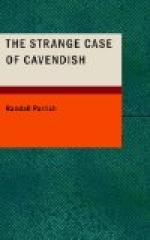But the one object across which the golden beams of light fell as though in soft caress was the motionless figure of a man lying upon his back beside the table near the drapeless window. Across his face and shoulders were the charred remains of what undoubtedly had been curtains on that window. A three-socketed candle-stick filled with partially burned candles which doubtless had been knocked from the table was mute evidence of how the tiny flame had started upon its short march. As to the man’s injuries, a blow from behind had evidently crushed his skull and, though the face was seared and burned, though the curtain’s partial ashes covered more than a half of it, though the eye-lashes above the sightless eyes were singed and the trim beard burned to black stubs, the face gave mute evidence of being that of Frederick Cavendish.
In this grim scene a tiny clock on the mantel began pealing the hour of eight. As though this were a signal for entrance, the door at the end of the bookcase opened noiselessly and a man, smooth faced, his hair brushed low across his forehead, stepped quietly in. As his eyes surveyed the grewsome object by the table, they dilated with horror; then his whole body stiffened and he fled back into the hall, crashing the door behind him.
Ten minutes later he returned, not alone, however. This time his companion was John Cavendish but partially dressed, his features white and haggard.
With nervous hands he pushed open the door. At the sight of the body he trembled a moment, then, mastering himself, strode over and touched the dead face, the other meanwhile edging into the room.
“Dead, sir, really dead?” the late comer asked.
Cavendish nodded: “For several hours,” he answered in an unnatural voice. “He must have been struck from behind. Robbery evidently was the object—cold-blooded robbery.”
“The window is open, sir, and last night at twenty minutes after twelve I locked it. Mr. Cavendish came in at twelve and locking the window was the last thing I did before he told me I could go.”
“He left no word for a morning call?”
Valois shook his head: “I always bring his breakfast at eight,” he explained.
“Did he say anything about suddenly leaving the city for a trip West? I heard such a rumour.”
“No, sir. He was still up when I left and had taken some papers from his pocket. When last I saw him he was looking at them. He seemed irritated.”
There was a moment’s silence, during which the flush returned to Cavendish’s cheeks, but his hands still trembled.
“You heard nothing during the night?” he demanded.
“Nothing, sir. I swear I knew nothing until I opened the door and saw the body a few moments ago.”
“You’d better stick to your story, Valois,” the other said sternly, “The police will be here shortly. I’m going to call them, now.”




